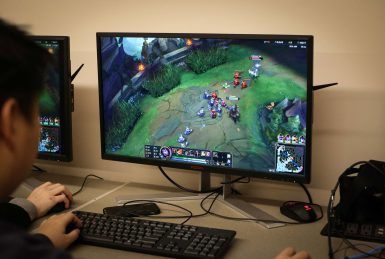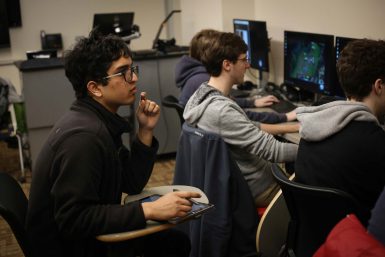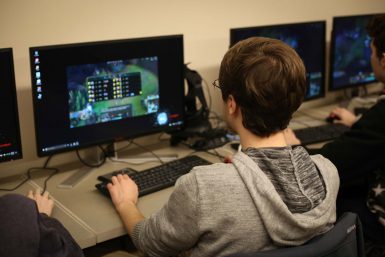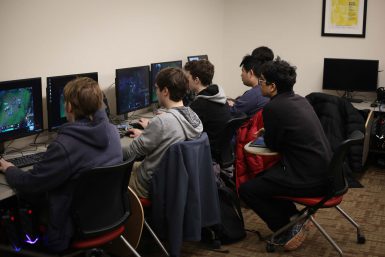ESports popularity booming on campus

When the Big Ten Network and Riot Games announced they would partner on a season-long League of Legends Championship in January 2017, Indiana University was one of 12 schools in the conference selected to compete. Since then, the partnership has been extended to 2019, and IU, particularly The Media School, has been working toward making its esports program officially sanctioned.
“If you look at the popularity of esports, it’s easy to see how bringing it into the Big Ten could benefit IU,” said Media School associate professor Galen Clavio, who oversees the school’s sports media program. Clavio serves as a liaison between The Media School and BTN, and serves as a connector for esports clubs, IU Athletics and other parties interested in popularizing esports on campus. “The entire thing exists on the internet, which makes it attractive to big universities like this one.”
Esports, a competition of teams playing video games with other teams, has only an unofficial presence at IU so far. The two main organizations — Gaming @ IU , a student group focused on playing video games and IN Game, an informal game research group — meet on their own time and have no ties to the BTN or IU Athletics.
Gaming @ IU comprises multiple teams of three to six players, depending on the game, who are at a similar skill level. They play popular games like “Overwatch,” “League of Legends,” and “Rocket League” competitively and stream some of their matches on Twitch, a livestreaming video platform popular among gamers. Not only do the students play games, they also coach and mentor each other.

One of these coaches is Jon Mundle, a senior in the Kelley School of Business who has been in Gaming @ IU for three years. As the head coach of one of the club’s “League of Legends” teams, he manages his players, mediates relations with teams at other schools and seeks out competitions outside of their regular schedule. He also coaches his players in matches and helps them hone their skills using techniques he finds no different than normal coaching.
“I try to point out certain things that the player did wrong in the match instead of giving specific instructions,” Mundle said. “It’s up to the players to self-reflect and ask why they made certain decisions. There is a lot of critical analysis involved.”
On top of the two or three weekly practice sessions these teams hold remotely and in the Media School’s virtual reality room, Gaming @ IU also participates in other schools’ tournaments and 24-hour gaming marathons, which have attracted hundreds of students in the past. They also try to play matches with other schools in the Big Ten Conference like Michigan State, Penn State and Rutgers.
“Esports has progressed really quickly here at IU,” said Nic Aguirre, a web design and interactive data lecturer in The Media School who also serves as a coordinator for Gaming @ IU. “The word has been getting out about these organizations and there are a lot of people interested in participating.” As a result, the VR room is getting more difficult to book for sessions and the club’s events are attracting hundreds of people online sometimes.
Mundle says Gaming @ IU had about 50 new applicants last semester and the number has been growing steadily over the past few years. However, earning a spot on these teams isn’t easy. Applicants have to hold a certain national rank — determined by how many matches a player has won and lost on a game’s server — to be considered. Mundle says he and the other coaches also hold tryouts to test new players’ communication skills.

“I feel that we are athletes by most definitions of the word,” Mundle said. “We are developing mental skills in a competitive environment, the physical part isn’t important.”
Although Mundle views his team as a group of athletes in their own right, they are still not acknowledged as such but BTN. Members of the university, including Clavio, are working with the university’s athletics department and the network to change that, though.
“Having the athletics department involved gets us the Big Ten connection because they control the marks and logos,” Clavio said. “This is an opportunity to make IU more visible.”
It is also an opportunity for The Media School to get more involved.
“Ideally we will be able to move toward producing streaming broadcasts for esports competitions, although the platform we would use for that hasn’t been determined,” said Clavio in a follow-up email. “I would like to get students involved in both the production and on-camera roles for these broadcasts, and we are in the process of evaluating the technological and technical possibilities and constraints therein.”

Clavio is interested in getting esports news coverage from outlets like BTN because he believes it’s a growing worldwide phenomenon that students should understand. “Certainly I’d like to see our broadcasters get more opportunities, particularly in an area that our competitors in sports media education aren’t offering,” he continued in the email. But I also want to see our esports competitors get the publicity they deserve, and for esports as a whole to be seen as something that has worldwide appeal.”
Despite his desire for esports competitors to be recognized as varsity athletes of the university, Mundle says he thinks such recognition is unlikely. Even if that is true, Clavio says that having esports connected to athletics and made into a varsity sport isn’t necessarily essential with services like Twitch, a livestreaming video platform for gamers.
“Twitch is the future of broadcasting,” Clavio said. “Recent statistics show that something like 50 percent of people under the age of 25 are not watching cable. A lot of them are watching Twitch. There is a growth in watching others play games and advertisers want to get to those people, so there is money to be made.”
But, Aguirre said, having that BTN connection could mean a lot to the school and its future. “The biggest benefit of being a part of the Big Ten is that we will become more newsworthy,” Aguirre said. “With that name attached, we will be way more visible.”
Negotiations with BTN began last February, and Clavio said there is still a long way to go before an agreement is reached. In the meantime, though, he thinks esports is only going to get more popular and continue to evolve.
“We are in esports where football was in 1885,” Clavio said. “According to revenue forecasts, this will be a billion-dollar industry by 2021. IU basketball is good for the school in the United States but having an official esports team could get us recognition from around the world.”

